Scottsboro, Ga
Scottsboro, named after General John Scott,
was at one time a bustling village 4 miles south of Milledgeville.
Farish Carter bought the Scott Plantation
and invited his relatives and friends to settle there. In 1837 there were
three academies, 10 - 15 houses for summer occupants or permanent settlers.
According to History Stories of Milledgeville and Baldwin County "A delightful
and cultivated community than Scottsboro of those days can hardly be imagined."
Joanna Troutman, who designed and made the
first "lone star flag" of Texas, went to school here.
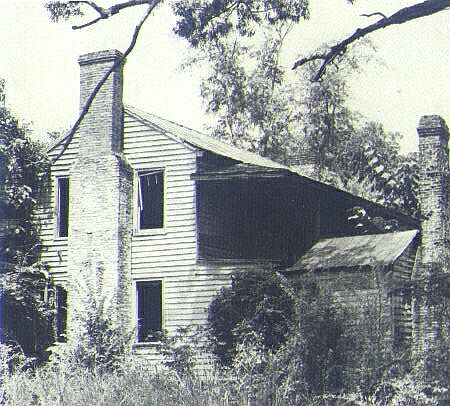
Scott-Carter-Furman-Smith House 1806-1970's
house was on Irwinton Rd./441
S.
Photo on left taken 1930's
by Eberhardt Studio. Photo on right by John Linley and Robbie Hattaway
early 1970's
Photograph
of the Scott-Carter-Furman-Smith house, Scottsboro, Baldwin County, Georgia,
ca. 1941 (link( 
Militia General
John Scott, originally from Virginia, made his home in Baldwin County building
the first frame home on S. Wayne St. In 1809 the home, purchased by the
state legislature, was made into the home of the governor. In 1806,
General Scott purchased a large tract of land in south Baldwin County in
what is now called Scottsboro and erected what was called the John
Scott-Carter-Furman-Smith House. His friend Jett Thomas had a cottage across
the road.
Farish Carter purchased the home and plantation about 1813 in addition
to an adjoining plantation on the Oconee River "Beuena Vista". Additions
to the original structure in were made. Greek revival columns were added
in 1820, and a verandah was added in 1880.
In 1887, the owner (Mrs. Furman)
had a "ten acre park, level as a floor, sodded with bermuda grass,
dotted all over with ancient oaks, beneath with graze in lazy liberty,
cows and calves, mares and colts, horses, sheep, and chickens, of her own
raising...About one hundred and fifty yards from the residence, Mr. Miller
is erecting a large stable.. "
Owners: General John Scott, Farish Carter,
John H. Furman, Farish Carter Furman, Emma LeConte Furman, John R. L. Smith,
descendants of John R.L. Smith. The house was demolished in 1968. A subdivision,
Furman Estates, is on the site now.
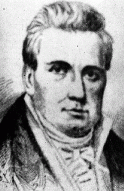
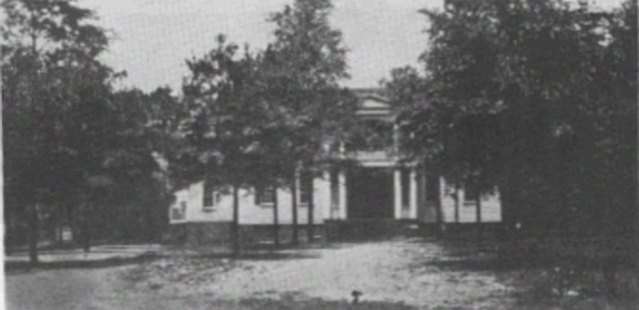
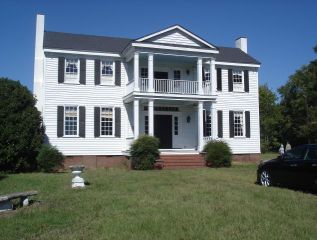 John Clark Woodville Plantation
1920's
Woodville 2010
John Clark Woodville Plantation
1920's
Woodville 2010
photo from History of Baldwin County Georgia
photo ny Eileen McAdams
Built by Gen.
John Scott circa 1813, this house was sold to Revolutionary Soldier and
Governor John Clark in 1819 when Gen. John Scott who moved to
Alabama. When Gov. Clark retired from Georgia politics in 1825
he sold his plantation to Seaton Grantland, printer, newspaper
editor and congressman. Gov. Clark moved to St. Andrews Bay, Florida
as a federal Indian agent where he died on October 12, 1832.
Seaton Grantland,
newspaper editor and congressman lived at Woodville Plantation until his
death in 1864. His daughter, Ann Virginia Grantland DuBignon inherited
the house and land (2,900 acres) and lived here until her death in
1909. Both she and her father are buried at Memory Hill Cemetery. According
to History of Baldwin County Georgia, Hester Anne Buffington, nurse
to the Grantland-DuBignon family. Born a slave in Georgia in 1810 she was
buried in the old negro cemetery on the Woodville Plantation in 1904. The
tombstone read "Hester Anne Buffington-Gone to Glory". The location of
the cemetery is not known. Christopher P. "Dixie" DuBignon
, son of Ann and Charles DuBignon lived here at Woodville until his death
in 1930. Over the years the house had various owners and is now beautifully
and completely restored by its new owners.
Some Early Families of Scottsboro and surrounding area: Ackridge, Allen,
Barnes, Batson, Bozeman, Breedlove, Buckner, Carmanni, Carter, Clark, Cook,
Cullen, DuBignon, Dubose, Grantland, Fitzgerald, Fulton, Furman,
Hall, Hansell, Harris, Hartridge, Hubbard, LeConte, Lingold, McDonald,
Meil, Miller, Moore, Polhill, Scott, Shinholser, Thomas, Turk, Wimberly.
Farish Carter started the Scottsboro Female Academy in 1828. Dr. Robert
C. Brown was the rector. Lucien and Victor LeTaste bought it and
changed the name to Georgia Female College. The Scottsboro Male Academy
was incorporated in 1831. The trustees were Lucius Q. C. Lamar,
Farish Carter, Seaton Grantland, James Bozeman, Green Jordan, Samuel Rockwell,
and Thomas W. Baxter. The Chalmers Female College was incorporated in 1851.
Washington Baird was Principal and trustees were Seaton Grantland, Farish
Carter, A. H. Hansell, J. T. Tucker, H. V. Johnson, Tomlinson Fort, S.
K. Talmage, J W. Baker, M. Grieve, I. L. Harris, D. R. Tucker, and James
C. Whitaker. According to History of Baldwin County Georgia "the
last building remaining from Dr. Brown's Academy was used as a chapel when
J.N. Stoney of St. Stephens Episcopal Church conducted for many years a
flourishing Mission Church in Scottsboro for the country people living
round about."
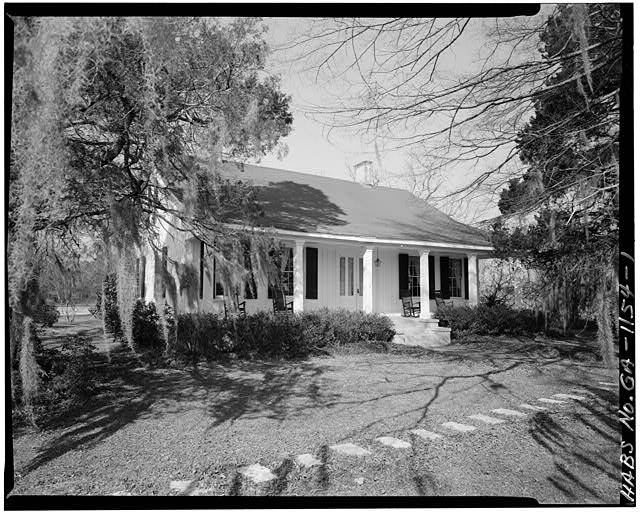
Photo by Kenneth Kay, 1981,
American Memory, Library of Congress
Polhill-Baugh House
A permanent resident of Scottsboro
was Judge John Goldwire Polhill. He was the Editor of the Federal
Union, State Representative and Judge of Superior Court, Ocmulgee Circuit.
Judge
John Goldwire Polhill was born Oct 16, 1793 in Newington, Screven
County, Georgia. He was the son of Thomas Polhill, a Baptist Minister and
trustee of Second Baptist Church in Savannah. Thomas Polhill also owned
land in Baldwin County, land lot number 295, that had been granted
by the state. Judge James Polhill of the Southern Circuit was Thomas
Polhill's son also.
A graduate
of Rhode Island College, he studied law in Augusta and was practicing in
Milledgeville by 1830. He was one of the founders of the Baptist
Church in Milledgeville and acting deacon of the church at the time of
his death. He was Judge of Superior Court of Georgia 1835-1836-1837
until the time of his death in April 1838. He was a stockholder
on the Great Western Railroad Company which formed in 1835 and a trustee
of the Southern Baptist College in Washington, Ga. incorporated in
1836. Judge and Mrs. Harriett A. Polhill lived in Scottsboro on the Gordon
Rd. Judge Polhill became sick in 1837, went to Cherokee County
for his health, and died there in 1838.
Judge and Mrs.
Harriet A. Polhill built their antebellum Greek Revival house in
Scottsboro on the Gordon Rd. Although Union troops set fire
to the house, the family came out of hiding and put the fire out. Little
damage was done but marks were still visible in 1968. Three
of their children were Benjamin M. Polhill and John M. Polhill
of Macon who died from an accident while surveying the Macon and Brunswick
Railroad in 1859 and Louisa Mary Polhill Butts, wife of James R.
Butts of Milledgeville. There is a Mr. and Mrs. Polhill buried in unmarked
graves at Memory Hill Cemetery in Milledgeville which could possibly
be the graves of Judge and Harriett Polhill. The house they
lived was owned by John G. Polhill; Hariett A. Polhill 1858-1866; William
Stevens estate 1866-1892; William Daniel & Ann E. Stevens Brewer 1892-1918;
Millard.Stewart Barnes 1918-1922; L.D. Smith 1922; W.E. Baugh estate 1922-1958.
Now owned by Major Joseph & Irene Baugh, and called Baugh Acres, it
is kept up beautifully by the Baughs.
Except from The War-Time Journal of a
Georgia Girl, 1864-1865, Eliza Frances Andrews
"About nine o'clock
we reached Scotsborough, the little American "Cranford," where the
Butlers used to have their summer home. Like Mrs. Gaskell's delightful
little borough, it is inhabited chiefly by aristocratic widows and old
maids, who rarely had their quiet lives disturbed by any event more exciting
than a church fair, till Sherman's army Marched through and gave them such
a shaking up that it will give them something to talk about the rest of
their days. Dr. Shine and the Texas captain had gone ahead of the wagon
and made arrangements for our accommodation. The night was very dismal,
and when we drew up in front of the little inn, and saw a big lightwood
fire blazing in the parlor chimney, I thought I had never seen anything
so bright and comfortable before. When
Mrs. Palmer, the landlady,
learned who Metta and I were, she fairly hugged us off our feet, and declared
that Mrs. Troup Butler's sisters were welcome to her house and everything
in it, and then she bustled off with her daughter Jenny to make ready their
own chamber for our use. She could not give us any supper because the Yankees
had taken all her provisions, but she brought out a jar of pickles that
had been hidden up the chimney, and gave us the use of her dining table
and dishes - such of them as the Yankees had left - to spread our lunch
on. While Charles and Crockett, the servants of Dr. Shine and the colonel,
were unpacking our baskets in the dining-room, all our party assembled
in the little parlor, the colonel was made master of ceremonies, and a
general introduction took place. The Texas captain gave his name as Jarman;
the shabby lieutenant in the war-worn uniform - all honor to it - was
Mr. Foster, of Florence, Ala.; the Baltimorean was Capt. Mackall, cousin
of the commandant at Macon, and the colonel himself had been a member of
the Confederate Congress, but resigned to go into the army, the only place
for a brave man in these times. So we all knew each other at last and had
a good laugh together over the secret curiosity that had been devouring
each of us about our traveling companions, for the last twenty-four hours.
Presently Crockett announced supper, and we went into the dining-room.
We had some real coffee, a luxury we owed the bride, but there was only
one spoon to all the company, so she arranged that she should pour out
the coffee, I should stir each cup, and Mett pass them to the guests, with
the assurance that the cup was made sweeter "by the magic of three pair
of fair hands." Then Mrs. Palmer's jar of pickles was brought out and presented
with a little tableau scene she had made up beforehand, even coaching me
as to the pretty speeches I was to make. I felt very silly, but I hoped
the others were too hungry to notice.
Supper over, we returned to the parlor, and I never spent a more delightful
evening. Riding along in the wagon, we had amused ourselves by making up
impromptu couplets to "The Confederate Toast," and now that we were comfortably
housed, I thanked Capt. Jarman and Dr. Shine for their efforts, in a pair
of impromptu verses to the same air. This started up a rivalry in verse-making,
each one trying to outdo the other in the absurdity of their composition,
and some of them were very funny. When we broke up for the night, there
were more theatricals planned by the bride, who disposed a white scarf
round her head, placed Metta and me, one on each side of her, so as to
make a sort of tableau vivant on the order of a "Three Graces," or a "Faith,
Hope, and Charity" group, and backed slowly out of the room, bowing and
singing, "Good Night." She really was so pretty and girlish that she could
carry off anything with grace, but I hadn't that excuse, and never felt
so foolish in my life.
Mrs. Palmer's chamber, in which Metta and I were to sleep, was a shed room
of not very inviting aspect, but the poor woman had done her best for us,
and we were too tired to be critical. When I had put my clothes off and
started to get into bed, I found there was but one sheet, and that looked
as if half of Sherman's army might have slept in it. Mett was too dead
sleepy to care; "Shut your eyes and go it blind," she said, and suiting
the action to the word, tumbled into bed without looking, and was asleep
almost by the time she had touched the pillow. I tried to follow her example,
but it was no use. The weather had begun to turn very cold, and the scanty
supply of bedclothes the Yankees had left Mrs. Palmer was not enough to
keep me warm. Then it began to rain in torrents, and presently I felt a
cold shower bath descending on me through the leaky roof. Metta's side
of the bed was comparatively dry, and she waked up just enough to pull
the cotton bedquilt that was our only covering, over her head, and then
went stolidly to sleep again. Meanwhile the storm increased till it was
terrible. The rain seemed to come down in a solid sheet, and I thought
the old house would be torn from its foundations by the fierce wind that
swept over it. The solitary pine knot that had been our only light went
out and left us in total darkness, but I was getting so drenched where
I lay that I was obliged to move, so I groped my way to an old lounge that
stood in a somewhat sheltered corner by the fireplace, and covered myself
with the clothing I had taken off. The lounge was so narrow that I couldn't
turn over without causing my cover to fall over on the floor, so I lay
stiff as a corpse all night, catching little uneasy snatches of sleep between
the wildest bursts of the storm. Early in the morning Mrs. Palmer and Jenny
came in with bowls and pans to put under the leaks. There were so many
that we were quite shingled over, as we lay in bed, with a tin roof of
pots and pans, and they made such a rattling as the water pattered into
them, that neither of us could sleep any more for laughing. The colonel
had given us instructions over night to be ready for an early start, so
when another pine knot had been lighted on the hearth, we made haste to
dress, before it burned out.
Mrs. Palmer had contrived to spread us a scanty breakfast of hot waffles,
fresh sausages, and parched wheat coffee. But the bride, as is the
way of brides, was so long in getting ready that it was nearly ten o'clock
before we started on our journey. It had stopped raining by this time,
but the weather was so cold and cloudy that I found my two suits of clothing
very comfortable. A bitter wind was blowing, and on all sides were to be
seen shattered boughs and uprooted trees, effects of the past night's storm.
The gentlemen had had all the baggage placed in front, and the floor of
the wagon covered with fodder, where we could sit and find some protection
from the wind. I should have felt tolerably comfortable if I had not seen
that Metta was feeling ill, though she kept up her spirits and did not
complain. She said she had a headache, and I noticed that her face was
covered with ugly red splotches, which I supposed were caused by the wind
chapping her skin. We put our shawls over our heads, but the wind played
such antics with them that they were not much protection. The bride, instead
of crouching down with us, mounted on top of a big trunk, the coldest place
she could find, and cheered us with the comforting announcement that she
was going to have pneumonia. It was beautiful to see how the big, handsome
colonel devoted himself to her, and I half suspect that was at the bottom
of her pneumonia scare - at least we heard no more of it. I offered her
some of our brandy, and the doctor made her a toddy, but she couldn't drink
it because it was grape and not peach. Everybody seemed disposed -to be
silent and out of sorts at first, except Metta and me, who had not yet
had adventures enough to surfeit us, and we kept on talking till we got
the rest of them into a good humor. We made the gentlemen tell us what
their various professions were before the war, and were delighted to learn
that our dear colonel was a lawyer. We told him that our father was a judge,
and that we loved lawyers better than anybody else except soldiers, whereupon
he laughed and advised the other gentlemen, who were all unmarried, to
take to the law. I said that about lawyers for the doctor's benefit, because
he looked all the time as if he were afraid one of us was going to fall
in love with him. I laughed and told Mett that it was she that scared him,
with her hair all cropped off from fever, and that dreadful splotched complexion.
He heaped coals of fire on my head soon after, when I was cowering down
in the body of the wagon, nearly dead with cold, by inviting me to get
out and warm myself by taking a walk. My feet were so cold that they felt
like lifeless clods and I could hardly stand on them when I first stepped
to the ground, but a brisk walk of two miles warmed me up so pleasantly
that I was sorry when a succession of mud holes forced me to get back into
the wagon."
The new Midway Elementary School
was built in Scottsboro in the 1990s.
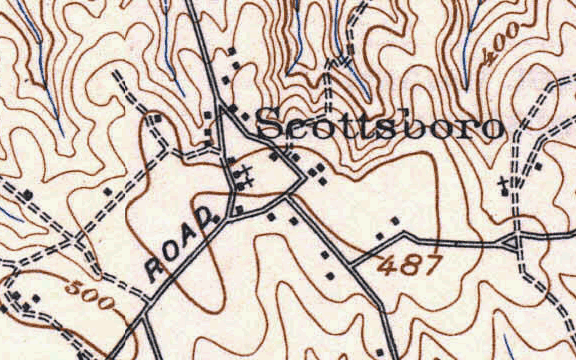
Scottsboro 1909 Typo Map
Sources: Oconee River, Tales to Tell,
Katherine
Bowman Walters;
Milledgeville, Antebellum Capital, James C. Bonner;
History
Stories of Milledgeville and Baldwin County, Leola Beeson;
History
of Baldwin County Georgia,
Anna Maria Green Cook; Architecture of
Middle Georgia, The Oconee Area, John Linley; 1840 Federal Census for
Baldwin County, Ga.; 1880 Federal Census for Baldwin County, Ga; The
War-Time Journal of a Georgia Girl,
Eliza Frances Andrews
Sources:1830 Federal Census; 1840 Federal
Census; ACTS OF THE GENERAL ASSEMBLY OF THE STATE OF GEORGIA.
PASSED IN NOVEMBER AND DECEMBER, 1835; ACTS of the General Assembly of
the STATE OF GEORGIA, PASSED IN NOVEMBER AND DECEMBER, 1836; ACTS OF THE
GENERAL ASSEMBLY OF THE STATE OF GEORGIA, PASSED IN NOVEMBER AND DECEMBER,
1837; ACTS OF THE GENERAL ASSEMBLY OF THE STATE OF GEORGIA, PASSED IN NOVEMBER
AND DECEMBER, 1838; ACTS AND RESOLUTIONS OF THE GENERAL ASSEMBLY OF THE
STATE OF GEORGIA 1965;
Macon Telegraph July 19, 1859; Georgia
Baptists : historical and biographical , by J. H. Campbell, Atlanta Consititution,
Feb. 23, 1913;
Architecture of Middle Georgia, The Oconee Area,
John Linley; Coopers Memoirs,
Cullen Wood
Eileen Babb McAdams copyright 2002








